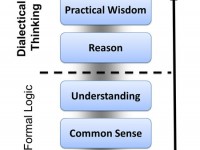This course leads participants from merely talking about dialectical thought forms to interactively eliciting them through a semi-structured interview and evaluating their use based on relevant fragments from a client interview. The program offers students the opportunity to show themselves and others that they have not only mastered “developmental theory”, but also know how to use it in practice. For the student, writing a the case study involves: Completing a 1-hr semi-structured cognitive interview following the protocol of the “Three Houses” (possibly in a modified form) Transcribing the interview(s) into English for discussion in the study cohort Selecting 30 structurally relevant fragments of the interview conducted Based on these fragments, presenting in class a coding sheet describing how the client’s cognitive profile is to be evaluated, for discussion in the study cohort At the end of the course, gathering and submitting all pertinent materials making up the case study to the Director of Education for personal feedback on scoring and focusing of client feedback. Read more Read More...
Tag: DTF
From AQAL to AQAT: Dialog in an Integral Perspective
By Bruno Frischherz - The background of this paper is a longitudinal study in adult development that is based on the structured interviewing required for using Laske’s Constructive Developmental Framework (CDF). In what follows, I will compare the CDF methodology with methodological tools offered by Integral Theory. Integral theory provides a helpful starting point for the analysis of themes and perspectives. But I will argue that integral theory is unable to fully account for the category of YOU that is fundamental in every dialog. Dialog is crucial not only for private communication but equally for scientific research, both in and between disciplines, as well as for professional practice. Given the limitations of Integral Theory, I am proposing a dialectical extension for AQAL which I call AQAT, meaning All Quadrants – All (dialectical) thought forms (context, process, relation, transformation). Download: Frischherz_2014_dialog_in_an_integral_perspective Read More...
Cognitive Fluidity – Its Etymology and Nuance
By Brendan Cartmel - The following article takes an important step, in my view, toward clarifying the relationship of Laske’s Dialectical Thought Form Framework to discussions of “integral thinking” in the sense of Wilber and his students. The article points to the gaps in what is called “integral” thinking relative to DTF and further differentiates what is concretely happening in using dialectical thought forms (DTFs). Otto Laske Background to Terms Cognitive Fluidity is the generative mechanism unlocking human potential and driving the evolution of human functioning; so says evolutionary anthropologist Steve Mithven. Cognitive and Social Intelligence are subsequent products of our Cognitive Fluidity. Mithven’s Cognitive Fluidity has correlates with JL Moreno’s idea of Spontaneity and Creativity being the main forces forming the cosmos and fluidising our cognition. What then are the origins of, and the concepts we imply, when we use the term Fluidity? Fluidity & CDF Dialectic Fluidity is a key metric in Otto Laske’s Cognitive Developmental Framework (CDF) and a key factor when designing Inter-developmental (IDM) consultation and coaching strategy. If Dialectic Fluidity is so important in understanding cognitive potential, what do we imply when we use the term Fluidity? What is the source of the term and... Read More...
Dialektische Textanalyse und Textentwicklung. Teil I
Von Bruno Frischherz - Die Dialektik hat als Kunst der Gesprächsführung und als philosophischer Denkansatz eine lange Tradition. Der vorliegende Beitrag zeigt, wie sich dialektisches Denken auch für die Analyse und Entwicklung von Texten nutzen lässt. Dialektische Textanalyse und Textentwicklung eignet sich insbesondere für Konzept- und Strategiepapiere, die einen hohen Anteil an abstrakter Denkarbeit verlangen. Der Schwerpunkt des ersten Teils des Beitrags liegt auf der dialektischen Textanalyse und ihrer Anwendung auf Strategiepapiere zur Green Economy. Die wichtigsten Werkzeuge der dialektischen Textanalyse sind die vier Klassen von dialektischen Denkformen, nämlich Kontext, Prozess, Relation und Transformation. Die dialektische Textanalyse erlaubt es, Denkformen in Texten zu beschreiben, zu messen und verschiedene Texte miteinander zu vergleichen. Die Textanalyse zeigt Stärken und Schwächen der Strategiepapiere aus dialektischer Sicht wie zum Beispiel Einseitigkeiten bei den Denkformen oder thematische Absenzen. Download: Frischherz_2013_Dialektische_Textanalyse_Teil_1 Read More...
Dialektische Textanalyse und Textentwicklung. Teil II
Von Bruno Frischherz - Die Dialektik hat als Kunst der Gesprächsführung und als philosophischer Denkansatz eine lange Tradition. Der vorliegende Beitrag zeigt, wie sich dialektisches Denken auch für die Analyse und Entwicklung von Texten nutzen lässt. Dialektische Textanalyse und Textentwicklung eignet sich insbesondere für Konzept- und Strategiepapiere, die einen hohen Anteil an abstrakter Denkarbeit verlangen. Der Schwerpunkt des zweiten Teils des Beitrags liegt auf der dialektischen Textentwicklung und ihrer Anwendung bei der Entwicklung eines E-Learning-Konzeptes für eine Fachhochschule. Das Modell der dialektischen Textanalyse lässt sich auch für die systematische Textentwicklung nutzen. Das Modell hilft, verschiedene Aspekte eines Themas systematisch nach inhaltlichen Kriterien und dialektischen Denkformen zu erhellen und schliesslich zu einer handlungsorientierten Synthese zu führen. Die dialektische Textanalyse und Textentwicklung stellt der angewandten Linguistik ein neues methodisches Instrumentarium zur Analyse und zur Synthese von Texten zur Verfügung. Download: Frischherz_2013_Dialektische_Textanalyse_Teil_2 Read More...
Review of De Visch’s “Mind(s) Creating Value”
J. De Visch's Leadership-- Mind(s) Creating Value J. De Visch's Leadership-- Mind(s) Creating Value Jan DeVisch continues to plow the depth of dialectical thinking to restructure and refine corporate conversations. This writer is excellently prepared for the task, since his professional career has long been focused on issues of global concern both for and regarding large organizations. Read More...
